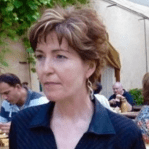
Numbers are not neutral and data, even when collected and analysed by scientists, reflect power and politics, a climate change scientist told a panel discussing data use for transformational change at the Global Landscapes Forum (GLF) Bonn Digital Conference.
“If we talk about numbers, then we also have to talk about politics and the power of making choices,” said Maria Brockhaus, a professor in the Department of Forest Sciences at the University of Helsinki.
“Numbers are not neutral…facts don’t always speak for themselves – they are interpreted, selected, put into a context,” Brockhaus said during a lively session on Leveraging data for transformational change towards climate- and forest-friendly food systems. The session looked at innovations and challenges in gathering data for decision-making, analysis and verification of outcomes measured against commitments.
Participants heard about new technology for monitoring and measuring land use and associated greenhouse gas sources and sinks; as well as data collection for such calculations as Forest Reference Emission Levels (FREL), a significant tool in climate change mitigation work.
Political choices based on data are made by decision-makers and not the scientists who collect the information, Daniel Murdiyarso, principal scientist with the Center for International Forestry Research (CIFOR), said in response to Brockhaus. “Let the numbers tell what the story is,” said Murdiyarso.
Yet numbers don’t tell the entire story, said Christine Lamanna, a climate change adaptation scientist with World Agroforestry (ICRAF). “Data are only one piece of evidence, and there are so many other types of evidence that are really important for decision-making and policy-making,” said Lamanna during the session, hosted by CIFOR.
“How do you combine this ‘hard’ evidence … with other ways of knowing and other sources of information, including farmers’ experiences?”
The GLF, which is jointly coordinated by CIFOR, UN Environment and the World Bank, hosted the online conference Food in the Time of Crisis: How to feed the world without eating the planet from 3-5 June 2020. Underpinned by the landscape approach, the conference streamed live online, featuring discussions on how to transform challenges into opportunities, delineating a potential road map for action. Nearly 5,000 people from 185 countries joined the event.
Meanwhile, data for an updated FREL submission this year from Indonesia to the secretariat of the U.N. Convention on Climate Change (UNFCCC) is now being collected, including peat and mangrove biomass, said Belinda Margono, director of Forest Resources Inventory and Monitoring, Indonesian Ministry of Environment and Forestry. That represents an update of the previous, 2016 FREL submission, added CIFOR’s Murdiyarso, who is working in Indonesia.
Mikaela Weisse, manager of the Global Forest Watch project at the World Resources Institute, described how new Radar Alerts for Detecting Deforestation (RADD) technology is being used in Indonesia to monitor deforestation. Palm oil companies can use the RADD data to ensure products in their supply chains do not come from deforested areas, she said.
Similar technology that provides a type of publicly available deforestation alert is being used by Indigenous communities in Peru to buttress legal complaints about deforestation there, said Weisse. “They’ve actually been so successful … that they now have almost zero deforestation alerts in their territory,” she said.
But data alone is only the first step and such early-warning information must lead to real action and results on the ground, added Weisse. A major challenge still exists is getting data results and information back to people working on the ground in areas without Internet access.
Underlying all steps towards transformational change and action on the ground — or away from it — are politics and power structures, and acknowledging the political dimensions of numbers is a starting point for all change, Brockhaus said.
We want you to share Forests News content, which is licensed under Creative Commons Attribution-NonCommercial-ShareAlike 4.0 International (CC BY-NC-SA 4.0). This means you are free to redistribute our material for non-commercial purposes. All we ask is that you give Forests News appropriate credit and link to the original Forests News content, indicate if changes were made, and distribute your contributions under the same Creative Commons license. You must notify Forests News if you repost, reprint or reuse our materials by contacting forestsnews@cifor-icraf.org.












